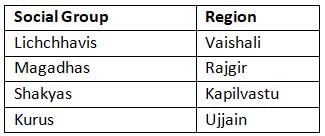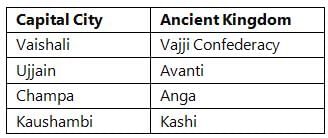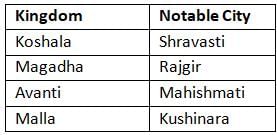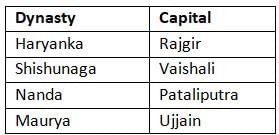Test: Old NCERT (RS Sharma) - Territorial States & The First Magadhan Empire - UPSC MCQ
20 Questions MCQ Test - Test: Old NCERT (RS Sharma) - Territorial States & The First Magadhan Empire
Consider the following pairs:

How many of the above pairs are correctly matched?

How many of the above pairs are correctly matched?
Consider the following statements:
- The Mahajanapadas were large territorial states that formed before the rise of the Magadha Empire.
- The use of iron for weapons and agricultural tools was crucial for the development of the Mahajanapadas.
- The Kingdom of Kashi was absorbed by Magadha during the expansion of the Magadha Empire.
How many of the statements given above are correct?
Consider the following statements:
- Magadha's earliest capital was Pataliputra.
- Rajgir, surrounded by five hills, served as a strategic and impregnable capital for Magadha.
- The agricultural fertility of Magadha was due to its location in the arid regions of the Gangetic plain.
How many of the statements given above are correct?
Consider the following pairs:

How many of the above pairs are correctly matched?
Consider the following statements:
- Bimbisara used marriage alliances as a strategy to strengthen Magadha's position among the Mahajanapadas.
- The Nanda dynasty succeeded the Maurya dynasty in Magadha.
- Magadha utilized elephants in warfare before the rise of the Maurya dynasty.
How many of the statements given above are correct?
Consider the following pairs:

How many of the above pairs are correctly matched?
Assertion (A): The extensive use of elephants in warfare was a significant factor in the military success of the Magadhan empire.
Reason (R): Elephants provided a psychological advantage over enemies not accustomed to facing them in battle.
Consider the following statements:
- The rivalry between Magadha and Avanti ended with the Shishunaga dynasty's conquest of Avanti.
- Mahapadma Nanda expanded the Magadhan empire by conquering Kalinga and claiming to be the sole sovereign.
- Alexander the Great invaded the Magadhan empire but was repelled by the Nanda dynasty.
How many of the statements given above are correct?
Assertion (A): The strategic location of Pataliputra, at the confluence of several rivers, made it an ideal capital for the Magadhan empire.
Reason (R): Cities located at river confluences were crucial for trade, defense, and controlling the surrounding regions.
Consider the following statements:
- Iron deposits near Rajgir gave Magadha a military advantage due to superior weapons.
- Pataliputra was chosen as a capital of Magadha for its easy defensibility and strategic location for trade.
- The social structure of Magadha was traditional, with the orthodox Brahmanas dominating its society.
How many of the statements given above are correct?
Consider the following pairs:

How many of the above pairs are correctly matched?
Assertion (A): The Nanda dynasty's downfall was inevitable due to their unpopularity among the masses and weak leadership in the later period.
Reason (R): Successful empires in ancient India were typically characterized by strong, charismatic leaders and the support of the population.
Consider the following statements:
- Statement-I: Magadha's emergence as a powerful state was significantly aided by its geographical location, which facilitated control over trade routes and access to iron deposits.
- Statement-II: The strategic importance of Magadha's capitals, Rajgir and Pataliputra, was solely due to their fortified positions and had little to do with their roles in trade and commerce.
Which one of the following is correct in respect of the above statements?
Consider the following pairs:

How many of the above pairs are correctly matched?
Consider the following statements:
- The Nandas were overthrown by the Maurya dynasty primarily due to their unpopularity and oppressive rule
- Mahapadma Nanda's conquest of Koshala and Kalinga significantly expanded the territory of the Magadhan empire.
- The use of elephants in warfare by Magadha was pioneered during the reign of the Maurya dynasty.
How many of the statements given above are correct?
Consider the following statements:
- The Kingdom of Anga was initially a powerful neighbor of Magadha before being conquered by Bimbisara.
- Avanti, with its capital at Ujjain, was a significant competitor to Magadha due to its rich iron deposits.
- The economic prosperity of Magadha was largely dependent on its agricultural productivity, which was negligible compared to its trade and commerce.
How many of the statements given above are correct?
Assertion (A): Magadha became the most powerful kingdom in ancient India due to its geographical advantages and access to iron deposits.
Reason (R): The strategic location of Magadha's capitals and the availability of resources like iron were pivotal in ensuring its military and agricultural dominance.
Consider the following statements:
- The use of coins and the rise of towns were crucial for the economic prosperity of Magadha.
- The Shishunaga dynasty moved the capital of Magadha from Rajgir to Pataliputra.
- Bimbisara's policy of conquest and aggression was primarily focused on expanding Magadha's territory south of the Ganges River.
How many of the statements given above are correct?
Consider the following statements:
- The military innovations of Magadha, including the use of a war engine and a mace-attached chariot, were developed during Ajatashatru's reign.
- The expansion of the Magadha empire under the Nandas was limited to the eastern regions of India.
- Pataliputra's selection as a capital was due to its defensible location, surrounded by rivers, which made it easily defensible from attacks.
How many of the statements given above are correct?
Assertion (A): The Maurya dynasty succeeded the Nanda dynasty due to Chandragupta Maurya's strategic alliances and military strength.
Reason (R): Chandragupta Maurya's alliance with Chanakya was instrumental in overthrowing the Nanda dynasty.



















